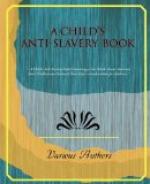Poor Lewis! He very well knew the meaning of that taunt, and he did not open his mouth. No threat of a dark closet ever frightened a free child so much as the threat of being sold to a Southern plantation terrifies the slave-child of Kentucky.
Lewis walked slowly toward the kitchen, to see Aunt Sally. It was to her he used to go with all his troubles, and sometimes she scolded, and sometimes she listened. She was very busy dressing the vegetables for dinner, and she looked cross; so the little fellow crept into the chimney corner and said nothing; but he thought all the more, and as he thought, the sad tears rolled down his tawny cheeks.
“What is the matter now, little baby?” was Aunt Sally’s tender inquiry.
Lewis commenced his pitiful tale; but as soon as Aunt Sally heard that it was about learning to read, she shut him up with “Good enough for you! What do you want of a book? Readin’ isn’t for the likes of you; and the less you know of it the better.”
This was poor sympathy, and the little fellow, with a half-spiteful feeling, scrambled upon a bench near by, and tumbled out of the window. He alighted on an ash-heap, not a very nice place to be sure, but it was a retired corner, and he often hid away there when he felt sad and wanted to be alone. Here he sat down, and leaning his head against the side of the house, he groaned out, “My mother, O my mother! If you ain’t dead, why don’t you come to me?”
By degrees he calmed down, and half asleep there in the sunshine, he dreamed of the home that he once had. His mother was a noble woman, so he thought. Nobody else ever looked so kindly into his face; he was sure nobody else ever loved him as she did, and he remembered when she was gay and cheerful, and would go all day singing about her work. And his father, he could just remember him as a very pleasant man that he used to run to meet, sometimes, when he saw him coming home away down the road; but that was long ago. He had not seen him now for years, and he had heard his mother say that his father’s master had moved away out of the state and taken him with him, and maybe he would never return. Then Lewis’s mother grew sad, and stopped her singing, though she worked as hard as ever, and kept her children all neat and clean.
And those dear brothers and sisters, what had become of them? There was Tom, the eldest, the very best fellow in the world, so Lewis thought. He would sit by the half hour making tops, and whistles, and all sorts of pretty playthings. And Sam, too! he was always so full of fun and singing songs. What a singer he was! and it was right cheerful when Sam would borrow some neighbor’s banjo and play to them. But they were all gone; and his sad, sweet-faced, lady-like sister Nelly, too, they were all taken off in one day by one of the ugliest negro-drivers that ever scared a little slave-boy’s dreams. And it was while his mother was away from home too. How she did cry and take on when she came back and found them all gone, and she hadn’t even the chance to bid them good-by! She said she knew her master sent her off that morning because he was going to sell her children.




